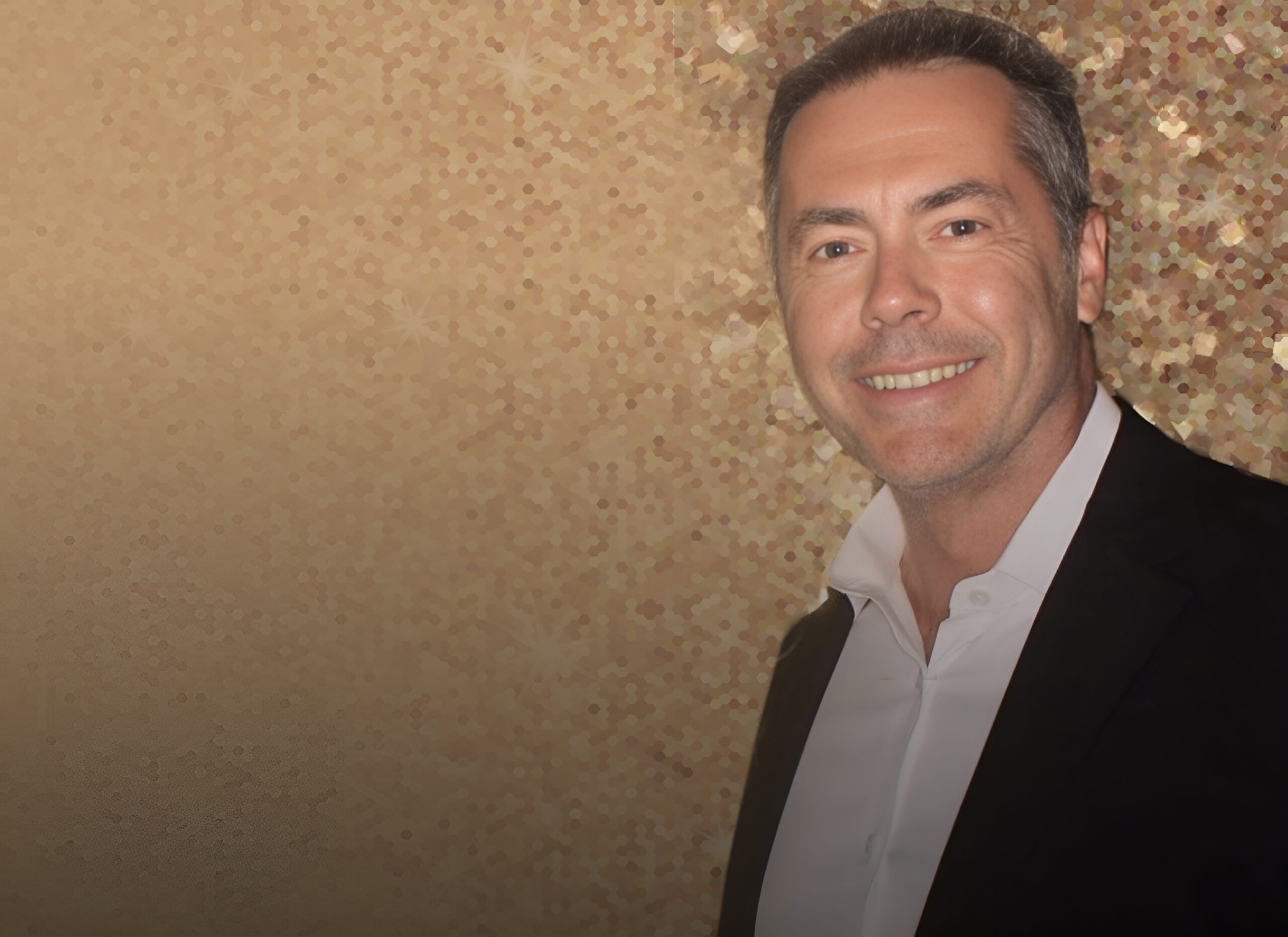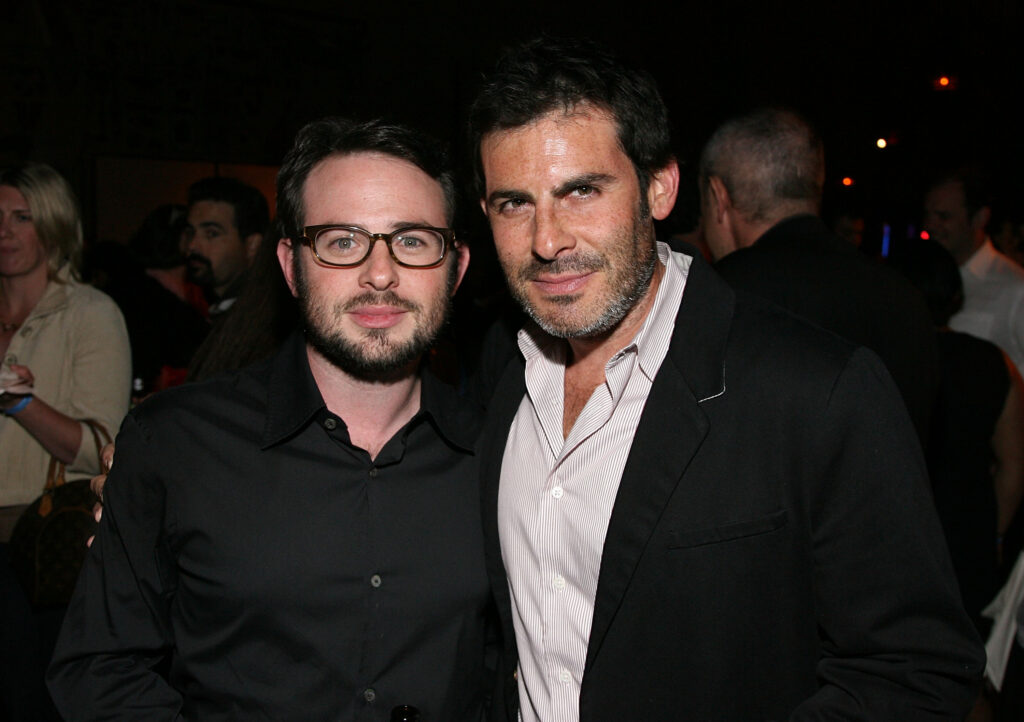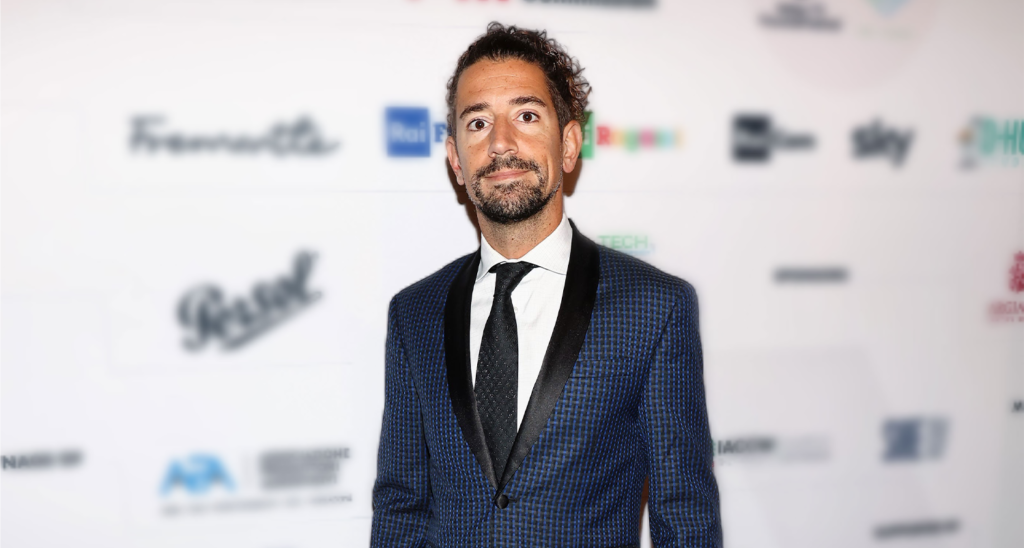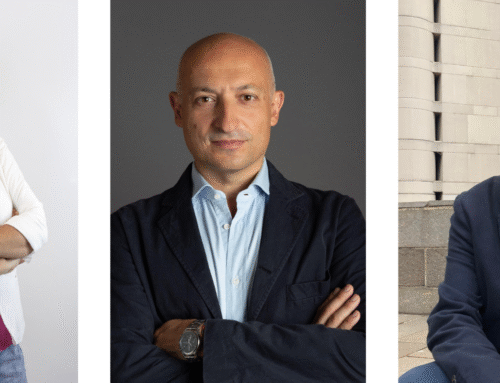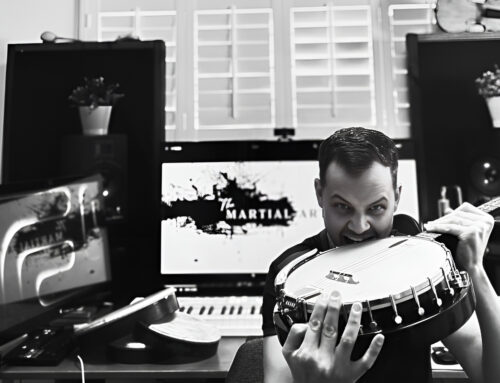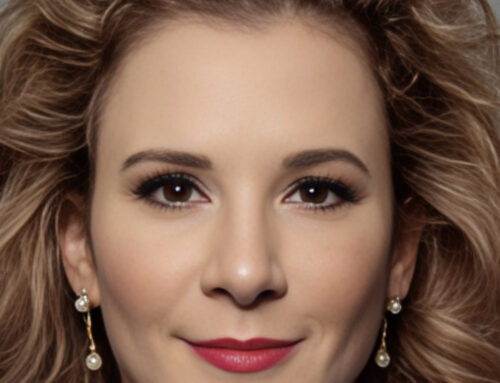In conversation with Vaun Wilmott
Our first ‘guest’ is Vaun Wilmott, showrunner, screenwriter, author, and producer of successes such as Star Trek, Dominion, and Sons of Anarchy. He started as an actor. In 1994, Wilmott appeared in the Beverly Hills 90210 series. Then he became a screenwriter for shows like Star Trek, Discovery, and Sons of Anarchy. Wilmott also wrote the fantasy novel “The Outcast” in 2007. The turning point of his career was the SyFy television pilot of the tv series Dominion, based on the 2010 fantasy film Legion. He wrote the script and worked as Co-Executive Producer for the series’ two seasons. His last projects saw him as an executive producer for the tv series Prison Break, Star Trek Discovery, and Jack Ryan, starring John Krasinsky. In spring 2022, he was in Florence and Prato as one of the lecturers of “Showrunner Lab,” organized by the Toscana Film Commission and Good Girls Planet in collaboration with ITTV, The Italian TV Forum&Festival of Los Angeles. He trained the Italian audience about the showrunner profession, an essential career in the USA, relatively new in Italy. Here he talks about his career, the movie and tv industry, his artistic choices, and, of course, a good amount of rejection.
Mr. Wilmott, you decided to jump behind the camera after a beginning as an actor. Why so?
I’ve always been creative and artistic, and I always had in the back of my mind that being an actor would be interesting. After school in Santa Barbara, I went to Los Angeles to give it a try. My big claim to fame was on the 90210′ series, but the whole process was emotionally hard. You have to be able to handle an amount of personal rejection I wasn’t built for. I knew I wanted to do something artistic. I just knew I couldn’t do that. Acting is fun. It’s the kind of soul-crushing part of the auditions I couldn’t stand.
You didn’t experience rejection as a writer as well?
Yes, there’s so much rejection in doing anything artistic, but there is a slight separation between writing something that becomes this thing sitting on a table. Whereas being an actor, it felt very personal. How decisive are rejections to grow in the entertainment industry? It either stops you, or you grow. Over the years, I’ve had talented writer friends who gave up, got out of the business, and no longer did it. You either take each rejection as part of the process, and it’s just one step closer to getting to where you want to go, or you let it kind of beat you down. What did you do when you decided your acting career was over? I started to sell shampoos. I needed real money, so I started selling beauty products to 200 salons in Los Angeles. I did that for two years, which allowed me to enter pharmaceutical sales. Twenty years ago, pharmaceutical sales in the States were fantastic: sound money, a lot of free time to do what you wanted. That’s when I started writing. I bought all the books, Syd Field’s book, Robert McKee’s book, and all the famous screenwriting, structure, and dialogue books. I also got my hands on as many scripts as possible and read voraciously. It was all self-taught. I learned the craft through reading other people’s material, and I started to write.
Was Dominion your first script?
No, that was probably my ninth. I spent ten or thirteen years writing and practicing. So, eight ‘nos’ before a yes? A lot more than that. It wasn’t just no on the scripts. It was no on getting an agent, no on getting a manager, no on a pitch. It feels like, at that stage, nos are everywhere. Did your experience as a pharmaceutical seller help you with pitching? Yes, it did. Most writers are not very good at pitching. They want to write and don’t want to go into rooms with people and have to pitch. Being a pharmaceutical sales rep, I had to go into doctors’ offices where they didn’t want me. I had to charm my way past the staff instructed not to let me in, and in five minutes, to get to the doctors and quickly pitch them why they should be writing your drug versus another drug. That skill has turned out to be my superpower.
So, with your pharmaceutical pitching skills, you finally got a yes for your first tv show, Dominion, and you started immediately as an executive producer and showrunner.
I was lucky. Usually, studios don’t put a young writer on their first experience as a showrunner, but they did. They decided to send me to South Africa, where the shooting was starting. I was terrified. We went down there, and it was a fantastic experience. It was a learning trial by fire. How Hollywood and the business has changed since your beginning? When I started, networks were the game in town. Now, the landscape has completely changed because you’ve got the three main networks in America, you’ve got all these international networks all over the world, you’ve got all the streamers: Apple, Amazon, Netflix, Peacock, Paramount plus, Hulu, Disney +. Whereas there used to be three or four shops in town that you could sell something to, now it’s nine, ten places. And that’s amazing. Then a pandemic occurred.
How did it affect the industry?
It was tough to keep productions going because one person would get it at any moment, and then it would shut down either part of the production or all of it. It was incredibly costly to the studios and the networks. Most of them were running at 10 or 20%, extra costs just for COVID. But it is impressive how well the industry adapted to continue making shows. How do you see the industry 10-20 years from now? I think that the opportunities for new voices and new artists are going to increase. I believe that the demand we’re seeing now for narrative storytelling and product will increase. Today we have many ways to consume stories, TV shows, and movies. On your phone, on your iPad, etcetera. Some players will get pushed out, or they won’t succeed. Some others will do well. For example, Netflix is not being quite as dominant as they were, and it’s trying to figure out how to reinvigorate its situation. Still, I’m pretty sure the industry is getting bigger and bigger and even more global. If you live in Italy, China, or London, you’ll be able to check out whatever show you want and watch it with no borders.
Is there a recipe for the perfect TV show? I think so. If you look at all great shows that we all agree are great, for whatever reason they get like 90% on Rotten Tomatoes, they usually have similar patterns in common that you can identify. But I also think there’s an alchemy to a great story. You’ll need a little bit of unplanned magic. For example, if you took Breaking Bad and put two different actors in that, it might be a completely different show. Is casting a critical element in a show? It is crucial. It can ultimately make or break a role, a story, a whole pilot, or a series, and you never know. You can make your best gut call. Editing is also essential. Yes, the showrunner usually finds people he’s worked with that he loves, but the industry is so busy now that everybody is working. So, you need to look at their old work. You look at their reels to see how they cut things together. You meet them and ask yourself: do I want to sit in a dark room with them for 12 hours? Then, just like everything else, you go with your gut. This job involves some creativity and a lot of gut-going decisions.
Share:
Our first ‘guest’ is Vaun Wilmott, showrunner, screenwriter, author, and producer of successes such as Star Trek, Dominion, and Sons of Anarchy. He started as an actor. In 1994, Wilmott appeared in the Beverly Hills 90210 series. Then he became a screenwriter for shows like Star Trek, Discovery, and Sons of Anarchy. Wilmott also wrote the fantasy novel “The Outcast” in 2007. The turning point of his career was the SyFy television pilot of the tv series Dominion, based on the 2010 fantasy film Legion. He wrote the script and worked as Co-Executive Producer for the series’ two seasons. His last projects saw him as an executive producer for the tv series Prison Break, Star Trek Discovery, and Jack Ryan, starring John Krasinsky. In spring 2022, he was in Florence and Prato as one of the lecturers of “Showrunner Lab,” organized by the Toscana Film Commission and Good Girls Planet in collaboration with ITTV, The Italian TV Forum&Festival of Los Angeles. He trained the Italian audience about the showrunner profession, an essential career in the USA, relatively new in Italy. Here he talks about his career, the movie and tv industry, his artistic choices, and, of course, a good amount of rejection.
Mr. Wilmott, you decided to jump behind the camera after a beginning as an actor. Why so?
I’ve always been creative and artistic, and I always had in the back of my mind that being an actor would be interesting. After school in Santa Barbara, I went to Los Angeles to give it a try. My big claim to fame was on the 90210′ series, but the whole process was emotionally hard. You have to be able to handle an amount of personal rejection I wasn’t built for. I knew I wanted to do something artistic. I just knew I couldn’t do that. Acting is fun. It’s the kind of soul-crushing part of the auditions I couldn’t stand.
You didn’t experience rejection as a writer as well?
Yes, there’s so much rejection in doing anything artistic, but there is a slight separation between writing something that becomes this thing sitting on a table. Whereas being an actor, it felt very personal. How decisive are rejections to grow in the entertainment industry? It either stops you, or you grow. Over the years, I’ve had talented writer friends who gave up, got out of the business, and no longer did it. You either take each rejection as part of the process, and it’s just one step closer to getting to where you want to go, or you let it kind of beat you down. What did you do when you decided your acting career was over? I started to sell shampoos. I needed real money, so I started selling beauty products to 200 salons in Los Angeles. I did that for two years, which allowed me to enter pharmaceutical sales. Twenty years ago, pharmaceutical sales in the States were fantastic: sound money, a lot of free time to do what you wanted. That’s when I started writing. I bought all the books, Syd Field’s book, Robert McKee’s book, and all the famous screenwriting, structure, and dialogue books. I also got my hands on as many scripts as possible and read voraciously. It was all self-taught. I learned the craft through reading other people’s material, and I started to write.
Was Dominion your first script?
No, that was probably my ninth. I spent ten or thirteen years writing and practicing. So, eight ‘nos’ before a yes? A lot more than that. It wasn’t just no on the scripts. It was no on getting an agent, no on getting a manager, no on a pitch. It feels like, at that stage, nos are everywhere. Did your experience as a pharmaceutical seller help you with pitching? Yes, it did. Most writers are not very good at pitching. They want to write and don’t want to go into rooms with people and have to pitch. Being a pharmaceutical sales rep, I had to go into doctors’ offices where they didn’t want me. I had to charm my way past the staff instructed not to let me in, and in five minutes, to get to the doctors and quickly pitch them why they should be writing your drug versus another drug. That skill has turned out to be my superpower.
So, with your pharmaceutical pitching skills, you finally got a yes for your first tv show, Dominion, and you started immediately as an executive producer and showrunner.
I was lucky. Usually, studios don’t put a young writer on their first experience as a showrunner, but they did. They decided to send me to South Africa, where the shooting was starting. I was terrified. We went down there, and it was a fantastic experience. It was a learning trial by fire. How Hollywood and the business has changed since your beginning? When I started, networks were the game in town. Now, the landscape has completely changed because you’ve got the three main networks in America, you’ve got all these international networks all over the world, you’ve got all the streamers: Apple, Amazon, Netflix, Peacock, Paramount plus, Hulu, Disney +. Whereas there used to be three or four shops in town that you could sell something to, now it’s nine, ten places. And that’s amazing. Then a pandemic occurred.
How did it affect the industry?
It was tough to keep productions going because one person would get it at any moment, and then it would shut down either part of the production or all of it. It was incredibly costly to the studios and the networks. Most of them were running at 10 or 20%, extra costs just for COVID. But it is impressive how well the industry adapted to continue making shows. How do you see the industry 10-20 years from now? I think that the opportunities for new voices and new artists are going to increase. I believe that the demand we’re seeing now for narrative storytelling and product will increase. Today we have many ways to consume stories, TV shows, and movies. On your phone, on your iPad, etcetera. Some players will get pushed out, or they won’t succeed. Some others will do well. For example, Netflix is not being quite as dominant as they were, and it’s trying to figure out how to reinvigorate its situation. Still, I’m pretty sure the industry is getting bigger and bigger and even more global. If you live in Italy, China, or London, you’ll be able to check out whatever show you want and watch it with no borders.
Is there a recipe for the perfect TV show? I think so. If you look at all great shows that we all agree are great, for whatever reason they get like 90% on Rotten Tomatoes, they usually have similar patterns in common that you can identify. But I also think there’s an alchemy to a great story. You’ll need a little bit of unplanned magic. For example, if you took Breaking Bad and put two different actors in that, it might be a completely different show. Is casting a critical element in a show? It is crucial. It can ultimately make or break a role, a story, a whole pilot, or a series, and you never know. You can make your best gut call. Editing is also essential. Yes, the showrunner usually finds people he’s worked with that he loves, but the industry is so busy now that everybody is working. So, you need to look at their old work. You look at their reels to see how they cut things together. You meet them and ask yourself: do I want to sit in a dark room with them for 12 hours? Then, just like everything else, you go with your gut. This job involves some creativity and a lot of gut-going decisions.

